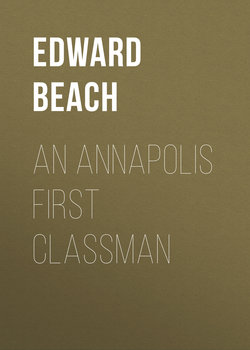Читать книгу An Annapolis First Classman - Beach Edward Latimer - Страница 8
CHAPTER VII
THE WEST POINT GAME
ОглавлениеIn another moment, but for Stonewell's quick action, the ball might have been put in play.
All the Naval Academy players instantly realized what Bligh had intended, and every one was intensely angry.
Gates, who had heard the signal, came running out on the field from the side lines; the Harvard players were tremendously surprised and did not know what to make of the commotion among the midshipmen, and the umpire was angrily ordering the midshipmen to play and Gates to get off the field. Short shrift was given to Bligh; the latter's attempted expostulation was cut short, and Stonewell passionately ordered him away. Blunt took his place as quarter. A place-kick was attempted, but was blocked, and time was soon called. The game ended with the score Harvard 3, Annapolis 0.
The midshipmen players ran to their dressing rooms, and much hot and angry talk followed. Some were for reporting Bligh and having him dismissed. Others were for giving him a physical beating; others proposed that he be put into complete "coventry."
"None of this will do, fellows," said Stonewell, after listening to a lot of angry proposals for Mr. Bligh's discomfiture. "Not one of us here will ever speak to the man; that goes as a matter of course; but we must be very careful to avoid doing anything that will tend to create discussion. Bligh's leaving the field was not understood by anybody but our own players. If he be put in 'coventry' or thrashed or reported or disciplined for what he did to-day the matter might leak out. West Point scouts were present watching our play, and Harvard plays Yale soon. The only thing to do is to keep absolutely mum; in this case the ends of justice and of discipline must give way to football necessities. We must keep faith with our friends of Yale."
"But is such a hound to be permitted to remain a midshipman?" burst out Harry Blunt. "I've been brought up to believe a midshipman could not do a dishonorable thing and remain a midshipman; is Bligh to do a scoundrelly act and not only go unpunished but also to have the secret of it kept by us who would have been disgraced if he had succeeded in his purpose?"
"Just so, Blunt," replied Stonewell. "There's nothing else to do. Should we report Bligh it is quite possible the whole thing would come out, and Gates' forward pass from a fake kick formation would become a matter of common knowledge. We may win the West Point game through it. Yale plays Harvard the same day we play West Point. Each of us must avoid doing a thing in regard to Bligh that will cause comment or discussion. His leaving the field at that time and his being put off the squad is bound to cause talk in the brigade. If anybody asks why, just say he didn't suit, and change the subject."
"That's right," broke in Professor Danton, who had been an interested listener, "but I just want to add one thing; in the many years I've been here, there have been at different times bad characters entered as midshipmen; but they're invariably found out and dismissed. Mark my words, Mr. Bligh will be no exception – he's undoubtedly a dishonorable character – don't worry about him; he'll not last a year here."
Much discontented grumbling followed, but all realized there was nothing to do except follow Stonewell's directions. As a natural result impotent rage was felt by the midshipmen players against Bligh. In spite of Bligh's dastardly act they were to be powerless to show their contempt for him or their resentment of his conduct, nor could the midshipmen of the brigade be told until after the football season had ended.
"And just think of the brigade giving Bligh the 'four N yell,' fellows, as he left the field," grumbled Harry Blunt.
The members of the team talked of Bligh's conduct rather than of the game in which they had just been defeated. Before the game they had hardly dared to hope for victory against Harvard, and all had now a satisfactory feeling that a good battle had been fought, and that no apology was necessary.
Amongst the midshipmen of Bancroft Hall much enthusiasm was felt for their team, but great surprise was exhibited when at supper Bligh was seen to go to his regular seat in the mess hall instead of going to the training table. It became instantly known that Bligh was off the football squad, and "Why?" was the question asked everywhere.
Bligh was very quiet, and in reply to numerous questions said he could not talk about the matter. Then all knew that he had been dismissed from the squad.
"Pass the word, Pete," said Glassfell to Peters, "that Stone says that no questions are to be asked, and Bligh's leaving the football squad is not to be talked about." It was wonderful how loyally this mandate was observed. It soon got to every midshipman of the brigade and in spite of the intense curiosity that existed every midshipman felt it a duty to the team to carry out Stonewell's wishes.
